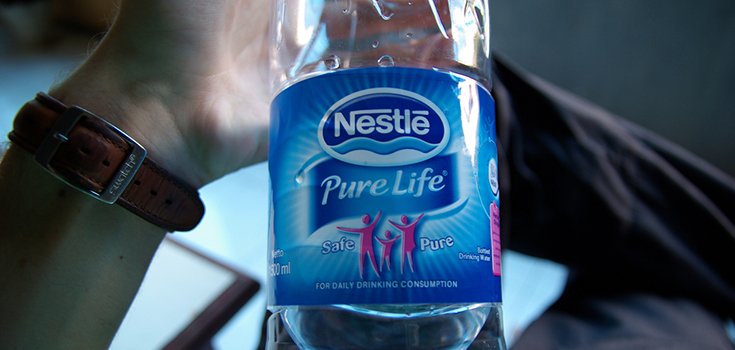Nestle Seeks More Groundwater to Expand Michigan Plant

The state of Michigan has given a preliminary go-ahead for food and beverage maker Nestle to nearly triple the amount of groundwater it will pump from beneath the state, to be bottled and sold at its Ice Mountain plant, approximately 120 miles from Flint. [1]

Nestle Waters North America asked the Michigan Department of Environmental Quality (DEQ) to allow the company to increase pumping from 150 to 400 gallons-per-minute at 1 of its production wells north of Evart.
The company already increased the well’s pumping rate last year and earlier this year, but needs the DEQ’s approval to max out the withdrawal capacity under the Section 17 of the Michigan Safe Drinking Water Act (SDWA). [1] [2]
The DEQ already issued a draft proposal for the request in January, and ended a public comment period on the subject on November 3. Carrie Monosmith, environmental health chief in the drinking water office, said the DEQ hadn’t received any comments. [1] [2]
Many Michigan residents feel Nestle has a lot of nerve asking for the increase, in light of Flint’s years-long nightmare over lead contamination in their drinking water. Many people in Flint still rely on bottled water for cooking, cleaning, and bathing as the government continues to drag its feet in replacing the corroded pipes. [1]
Nestle representatives defended the company’s efforts to pump more groundwater, saying the “U.S. market for bottled water in general is driving the bid for more Michigan groundwater.” [2]
That’s right, America. Nestle says it’s your fault.
If that’s not infuriating enough, Nestle gets to pump that water for free. Under state law, private property owners may withdraw from the aquifer under their property for free. The only cost is $200 in annual paperwork. [1]
The interstate Great Lakes compact prohibits water diversions outside of the Great Lakes basin, but a loophole in the law allows water to be sold outside the region, so long as it is shipped in bottles smaller than 5.7 gallons. [2]
Jeff Ostahowski, vice president of the Michigan Citizens for Water Conservation (MCWC), asks:
“The issue is the privatization of a critical resource. How much is too much?”
For years, MCWC has battled against Nestle to prevent it from expanding in the state.
According to Nestle and the DEQ, an environmental review shows the aquifer can withstand the proposed increase in pumping, and that it won’t hurt its flow, levels, or temperature of nearby surface waters.
But MCWC is looking for more assurances. Ostahowski said:
“It needs to be studied by all the best environmentalists, hydrologists and people acquainted with the science of where this water is actually coming from.
There are many different hydrologists who can look at the same data and come up with different conclusions.”
Ostahowski expressed frustration that the group wasn’t aware of Nestle’s plan until a Michigan news outlet contacted them for comment. He said:
“The DEQ should have sent us this information.”
Nestle will do whatever it takes to get its water wishes met, even if it means screwing people over to do it. The company was sued for stealing more than 1.8 billion gallons of water from California’s San Bernardino National Forest during the state’s worst drought and selling it back to the people at inflated costs.
Nestle’s then-CEO Tim Brown said he would increase the amount of water his company was stealing from the forest, if it could.
This past summer, Nestle bought a drought-stricken Canadian community’s water supply, sparking international outrage.
Nestle Chairman Peter Brabeck-Letmathe is even worse. He has said that water is not a human right, and should be privatized.

Keep all of this in mind the next time you’re tempted to buy food or water made by Nestle, because someone likely sacrificed something important for its production.
Sources:
[1] Common Dreams
[2] mlive.com

Here is a flashback for folks and who is responsible for these actions by Multi National Corporations.
JUN 24, 2015 The U.S. Supreme Court’s Cultivation of Corporate Personhood
Over the next week, the Supreme Court will decide cases on same-sex marriage, Obamacare, and lethal injection. So Monday’s rulings about raisins and hotels were not the focus of much interest. But they should be. Taken together, they represent an important victory for corporate personhood. And they suggest both the utility of that legal fiction, and its limits.
No legal question has sparked more recent controversy than whether corporations are people. Obviously, corporations are not human. Yet the Court has held that they, like people, are entitled to certain fundamental rights, including the freedom to make political expenditures (Citizens United) and the religious freedom to object to birth-control coverage in their employees’ health insurance (Hobby Lobby).
Many Americans, including the Court’s most liberal justices, object to the recent expansion of corporate rights. Yet, in Monday’s cases, corporations gained valuable new constitutional protections—and the liberals were on board.ponible for these outrageous acts.